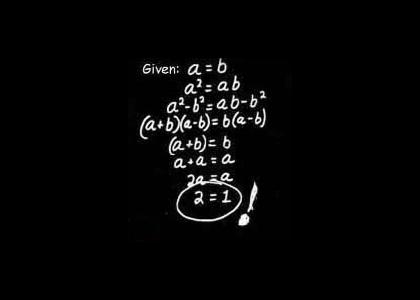Do Not Drink and Derive
Created on: May 16th, 2006

Do Not Drink and Derive
Sponsorships:
| user | amount | user | amount |
|---|---|---|---|
| No one has sponsored this site ( ._.) | |||
| Sponsor this site! | Total: $0.00 | Active: $0.00 | |
Vote metrics:
| rating | total votes | favorites | comments |
|---|---|---|---|
| (3.38) | 696 | 35 | 263 |
View metrics:
| today | yesterday | this week | this month | all time |
|---|---|---|---|---|
| 2 | 0 | 0 | 0 | 7,427 |
Inbound links:
| views | url |
|---|---|
| 49 | https://www.bing.com |
| 32 | http://www.math.uga.edu/~jstankew/fun.html |
| 5 | http://www.google.com.hk |
| 3 | https://www.facebook.com/ |
| 2 | http://www.stumbleupon.com/su/ |
Skorpius: "If a=2 and b=1, then a does not equal b from the start. This fails horribly, sorry."
Are you serious? I'm going to hope that you're not in high school. I'm also going to raise that, and hope that you're not in middle school. The assumption from the onset is a=b. if a=2 and b=1, does a=b? No. So none of the rest follows. As many have pointed out, the error comes from division by zero. If you assume that a=b, then when you subtract b^2 from both sides, you're zeroing out the equation.GG Educatio
"To get a value for 2a=a you would need to know the value of a, thus making the whole equation
redundant. 2a=a is the final step, there is no way you can get to 2=1 from there."
Divide by a.
As for "divide by zero error", there's no need to even go that far.
(a+b)(a-a) = b(a-b)
(a+b)(0) = b(0)
0 = 0
btw vizerei, dividing a number by 0 is not equal to infinite. it is indefinite.
the correct statement is that dividing a number that APPROACHES (to the limit) zero you get a number that approaches infinity. The divisor only gets closer to zero, but is NEVER equal to zero.
Zero is NOT to be mistaken for infinitesimally small numbers
This is an equation in which the variables equal everything and nothing.
a=b=(all reals) and a=b=(nonreal)
Yes a variable can equal multiple things in algebra. Because if at any point in the equation a variable can equal something, then it does. Unless that equation is augmented by another equation which causes it to have only a limited number of values.
lol, this is absolutely pathetic, ytmndoggers in this comments list arguing over an algebraic riddle that is a classic extra-credit question. The ytmnd was funny. The retarded freshmen* attempting to sound intelligent by regurgitating intermediate algebra? Hysterical.
*Obviously that does not mean everyone.
Invadertim: "Your all idiots. You can clearly see that in the transition from the 3rd to the 4rth line that there is a switch in which ab-b squared suddenly becomes b(a-b). This is impossible as that
would mean that a variable b is missing. This is nothing but a lack of effort. 1." How do you not know how to distribute multiplication over addition? lets do a quick check here. 5*2+5 = 15. 5(2+1)=5*3=15. lets replace with variables: b*a+b=b(a+1). ab-b^2 is just an extension. UNACCEPTABLE!!!!!!!!
Bold
Italic
Underline
Code
User Link
Site Link